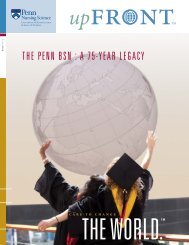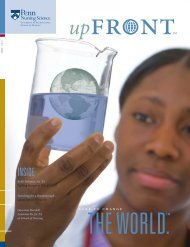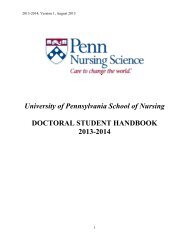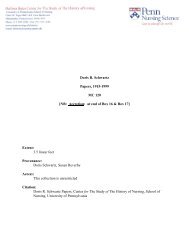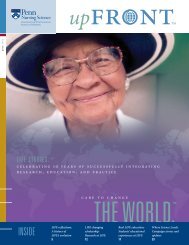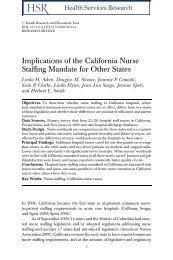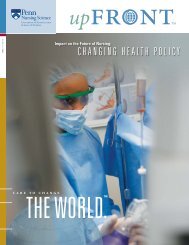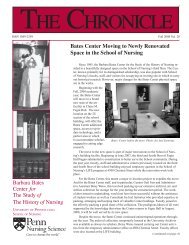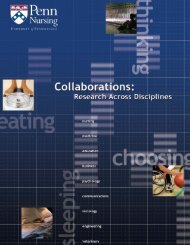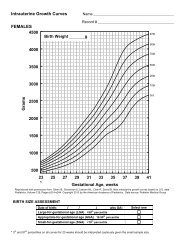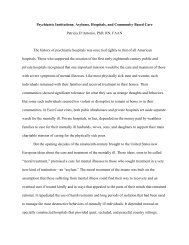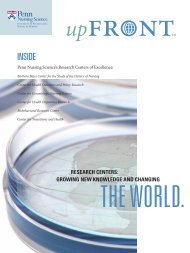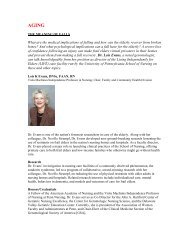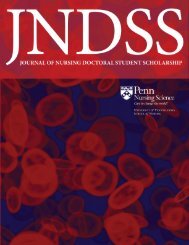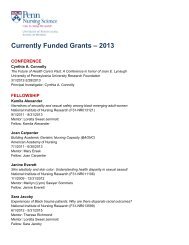Innovations: Nursing Science, Education, Practice - University of ...
Innovations: Nursing Science, Education, Practice - University of ...
Innovations: Nursing Science, Education, Practice - University of ...
You also want an ePaper? Increase the reach of your titles
YUMPU automatically turns print PDFs into web optimized ePapers that Google loves.
Maureen McCausland: The foremost<br />
challenge we face in nursing education<br />
is keeping our commitment to<br />
an intimate, caring nurse-patient relationship.<br />
We must teach students to<br />
cherish this relationship in the face <strong>of</strong><br />
tremendous pressure to move<br />
patients through the health-care system<br />
in a responsible way.<br />
We also face a challenge in recruiting<br />
the next generation <strong>of</strong> clinical<br />
nurses. Women have countless choices<br />
for their careers. Many now look<br />
askance at nursing because the public<br />
focus is on hospital lay<strong>of</strong>fs and closings.<br />
We need to tell students the<br />
positive reasons to enter the field,<br />
Norma Lang: Continuing to recruit<br />
the brain power into nursing is<br />
absolutely a top priority. We must<br />
continue to make nursing a vibrant<br />
option for the best and the brightest<br />
coming through high schools. We<br />
also need to help students find financial<br />
support for their education; this<br />
is becoming a bigger and bigger issue<br />
for students in all fields.<br />
When should we make children<br />
aware <strong>of</strong> options in nursing?<br />
Literally as soon as they start watching<br />
Sesame Street. Children see so<br />
many choices now, and they begin<br />
thinking about their own options.<br />
We have another challenge as educators.<br />
The health-care field is so<br />
complicated today. And we have students<br />
for such a short time to prepare<br />
them for the myriad options they<br />
will face. Structuring the educational<br />
experience requires a considerable<br />
amount <strong>of</strong> innovation to encompass<br />
“Structuring the<br />
educational ex p e r i e n c e<br />
requires a considerable<br />
amount <strong>of</strong> innovation<br />
to encompass all <strong>of</strong><br />
today’s realities.”<br />
— NO R M A LA N G<br />
Norma Lang,<br />
PhD, FAAN, FRCN, RN<br />
and we need to reach them when<br />
they’re young, before they choose<br />
another path. Talking with students<br />
in high school is clearly too late.<br />
When do you show young people<br />
the rewards <strong>of</strong> nursing? How do you<br />
craft a program that will capture<br />
their interests and their parents’<br />
interest?<br />
all <strong>of</strong> today’s realities: nurses deliver<br />
care everywhere from home to the<br />
work place, at levels ranging from<br />
extended care to institutional care to<br />
primary care and the incredibly complex<br />
hospital care. <strong>Nursing</strong> educators<br />
need to give students from the BSN<br />
to the PhD the critical decision-making<br />
and leadership skills and clinical<br />
expertise to both begin and continue<br />
their journey.<br />
Joyce Thompson: When I think <strong>of</strong> the<br />
challenges <strong>of</strong> nursing, I think <strong>of</strong> the<br />
Chinese sign for childbearing, which<br />
is a combination <strong>of</strong> “danger” and<br />
“opportunity.” As nursing educators,<br />
we must emphasize opportunities<br />
and turn the potential dangers, or<br />
challenges, into opportunities.<br />
But I believe “image” plays a major<br />
role. To move nursing forw a rd, we<br />
need to present ourselves as part n e r s<br />
with people from the beginning <strong>of</strong><br />
their lives until the end and help them<br />
understand that together we will<br />
i m p rove their quality <strong>of</strong> life along the<br />
w a y. This attitude will help us re p resent<br />
the patients’ best interests as the<br />
health systems and illness systems are<br />
readjusting. This means far more than<br />
possessing the skills to treat health<br />
p roblems; it also means learning the<br />
a rt <strong>of</strong> politics and understanding policy<br />
to get into a position <strong>of</strong> power to<br />
F a l l 1 9 9 9 13



